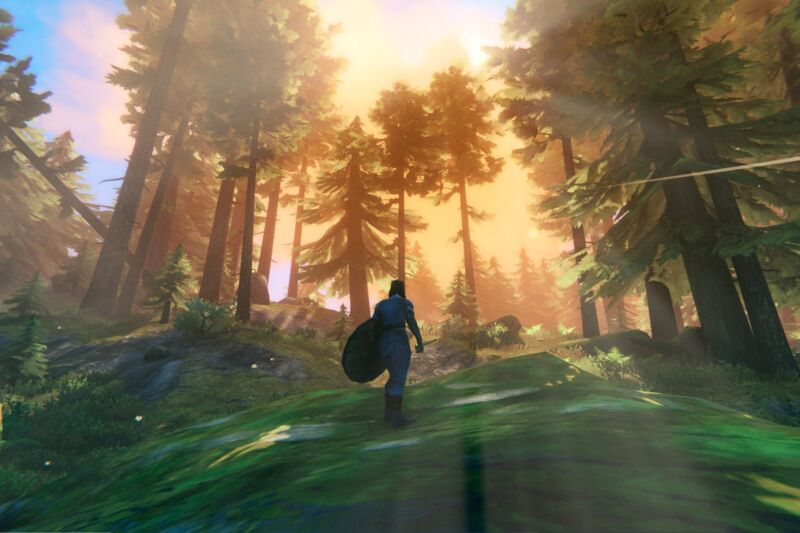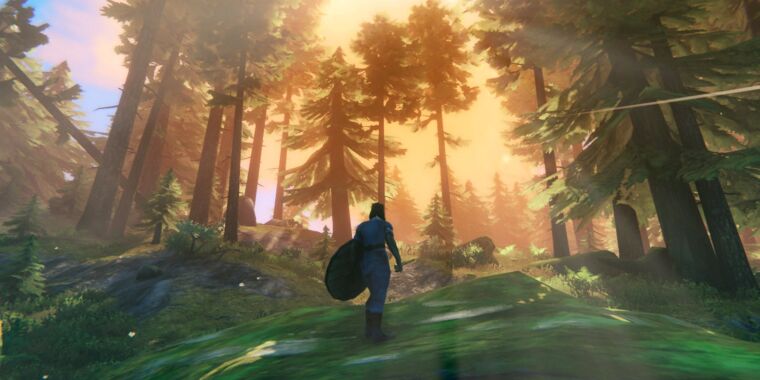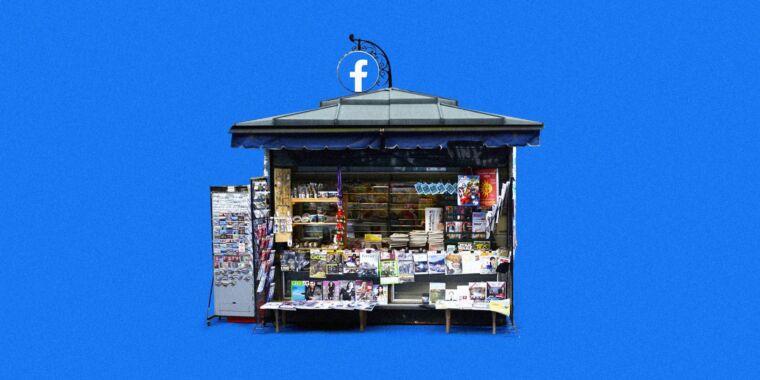
Iron Gate AB
Kylan Coats came up with a plan to start a studio before he had even made a game, as an undergrad spending summers as a QA tester between classes. Back then, his mid-thirties seemed like the age to make this transition. If things went to plan, he would have the experience to succeed, but if everything exploded, he could still return to a AAA career. Coats worked in the industry for 14 years, but it was only after an unforeseen layoff from Obsidian Entertainment that his husband reminded him of this conviction. “He brought it up like, ‘Hey, you’ve been talking about starting your own studio for the longest time, why not now?’” Coats says.
After a good year doing contract work, more profitable than any year previous, he started Crispy Creative. His first game was an idea he’d been mulling over for a while. “Every dev always has a few of their own game ideas,” he says. A Long Journey to an Uncertain End is a queer narrative space opera, in Coats’ words. Players control a rogue spaceship fleeing between colorful Mœbius-like planets; tasks include shuttling drag queens off on grand adventures. It’s not the type of game a bigger studio would touch, he says. With Crispy, not only is he free to be creative, but his work environment is healthy: Staff don’t have to kill themselves to meet a deadline, and he can nurture mental health and inclusivity. He’d been critical of leadership in the past, so starting Crispy was the moment to put up or shut up, he says.

“This is now over four years of me being independent. In about six months, this will have been the longest job I’ve ever had, which is really scary,” he says. “But also really crazy, because I’m like, ‘Why didn’t I do this earlier?’ I’m making so much more money, I have so much more freedom, why did I deal with the politics with big studios. And now I’ve talked to other people who are doing the same thing.” Coats is a small part of two big movements in the games industry. One is conspicuous. Last month, Microsoft bought Activision-Blizzard for $68 billion, the biggest tech purchase ever. Eleven days later, Sony, whose stock plummeted in the wake of Microsoft’s deal, devoured Bungie, creator of Halo and purveyor of Destiny. The games industry, it would seem, is consolidating. Yet, less conspicuously, the industry is also splintering. Developers say they feel like they are part of a wave: Veterans, weary of the industry’s increasing corporatization, are leaving the AAA world to forge their own path.
What makes a studio “indie”?
Independent is a sticky word. “Indie” evokes an aesthetic—pixel art or lo-fi graphics; deep themes or demanding mechanics—as much as a state of ownership, an ambiguity that can blur the facts on the ground. Independent funding varies: Developers tend to distinguish their status by budget size. Crispy, for instance, is closer to what most people think of when they think of indie development: a “single I” in response to the AAA. We’re tiny and scrappy; balancing client work, spare time, and no small amount of hope to put together our first title,” says Coats.
The studio Gardens, founded by the artists responsible for Journey, Dustforce, and What Remains of Edith Finch, call itself “triple I,” since it has received, for a small team at least, substantial financial support. The founders of Gravity Well, former developers at Respawn Entertainment, which made Apex Legends, explain that they are too big to consider themselves indie; but they are independent in that they have creative control. “[We’re] able to lean in to potentially riskier creative decisions, to prioritize team health, and provide significant profit sharing from our games to the team,” the team says over email.
Developers are artists, but making games is work. In fact, development, infamously exploitative and breakdown-inducing, is exactly the sort of work that the pandemic has made many of us less likely to tolerate. Couple stories on r/antiwork, in which employees with broken limbs are reprimanded for overuse of a stool, with Blizzard’s sexual-harassment scandals, and the Great Resignation, says Coats, could just as easily be called the Great Reprioritization. “When you’re faced with a potentially life-ending global pandemic, you question why are you killing yourself for all this stuff,” he says. “Because you could get sick next week and be in the hospital intubated.”
This type of work is notorious: the crunch. Drew McCoy, game director at Gravity Well, describes himself as a “recovering workaholic.” Bosses have long exploited the fact that games are a “passion industry,” he says. In his experience, you aren’t forced to crunch, but no one stops you either, a state of affairs that doesn’t work for people with kids; you end up with massive attrition as older developers leave.
In the build-up to Apex Legends, McCoy worked 80-hour weeks. The burnout afterward lasted more than a year. That he, a guy who was teaching himself to code in Basic at 9 years old, considered leaving the industry pointed to something rotten at its core. “We’re very open to everyone: If you need time off, we have an unlimited [paid time off] policy,” McCoy says. Crunch “has driven how I think about building a team and building company values and goals. Because it’s just nothing but detrimental. You get worse work from people.”
Developers are also fed up with other long-standing impediments. At Obsidian, Coats says, leadership was entrenched: He had to threaten to quit before he got “senior” in his title. Coats says there were few female leads, and female developers left because they didn’t see a future for themselves. Sarah Sands, executive producer at Gardens, left the industry twice for similar reasons: Being a woman in gaming meant she was paid less than her male peers. She was persuaded to go back by promises of the chance to push for a more diverse staff, a commitment to mental health, a 35-hour workweek, and robust benefits. Just the other week, in the middle of a sunny day, she went roller-skating and returned to work energized.








